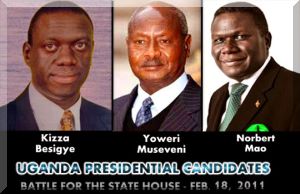Uganda Elections: A Financial Review

 |
Opposition parties caught in the aftermath of the election with no solid proof of fraud and resources to challenge the legitimacy of the new government are first casualties. They have no leverage to attract support away from the government because the President and his high-level supporters hold most of the ready cash.
The country’s finances will not improve significantly in the next fiscal year. In fact, food price inflation and fluctuations in the prices of oil and coffee will compound stress on the new budget. Any post-election spending will be highly charged politically. If it follows the pattern of Uganda’s history, the government will be tempted to divert discretionary spending, and even some non-discretionary funds to reward is supporters. If the government lives up to its rhetoric about tackling corruption and spends development funds where they are most needed – in opposition strongholds – they could repeat the purchasing of support which won Mr Museveni the Presidency and returned a National Resistance Movement (NRM) majority to Parliament and thus frustrate opposition efforts to re-organise.
The Inter-Party Coalition (IPC) faces a paradox. Small improvements in economic circumstances for the middle and wealthy slices of society did not win opposition candidates the idealistic voters they counted on, but neither did worsening fortunes for people at the bottom of the income scale translate into disaffected anti-government votes. Envelopes of cash from the President’s hands saw to that, but so did the opposition’s failures.
Opponents of the government have never been sufficiently organized to present countervailing power to the NRM in Parliament or in the Local Councils (LC’s). The Democratic Party (DP), Uganda People’s Congress (UPC) and the Forum for Democratic Change (FDC) all lack a national vision and fought the election only on the principle that Norbert Mao or Olara Otunnu or Kizza Besigye would make a better President than Mr Museveni.
The government’s campaign was limited mostly to the converse argument, but it was backed by hundreds of millions and possibly trillions of shillings. Without a policy vision or sacks of money, none of the IPC candidates could summon a convincing argument for votes. If the two-to-one vote count in the Presidential race is even reasonably accurate, then it is highly likely that the opposition was unable to sway any wavering or independent-minded voters at all and counted only the ideologically committed among their supporters. That makes the accusations of massive fraud retailed by Mr Besigye unconvincing.
The election may have been fought unfairly, but not on the day. Widespread outright stealing of votes or beating of voters was unnecessary. The contest was over long before anyone cast a ballot. In this sense, Uganda’s election resembled the victories of Barack Obama over John McCain in the United States in 2008 or the reaction against the Labour Party in the United Kingdom in 2010. A massive advantage in money, and the perception of ideological bankruptcy of opponents put Mr Obama and David Cameron in charge of their governments. The return of Mr Museveni, at this election at least, wasn’t much different.
The combined effects of financial strictures, an ineffectual opposition and the shift from violence-based electioneering to campaign strategies built on bribery is likely to further centralise political power in the Presidency and also to further degrade the ability of the economy to both grow and cope with commodity supply shocks. The President is already capable of sidelining Parliament when he chooses, and the LC’s have seen their power eroded by the centre steadily since the mid-1990’s. The President’s control over the budget is almost absolute, and he is steadily extending his influence over the Bank of Uganda by forcing it to make loans he deems necessary outside of its normal procedures.
Recent trends in world coffee and oil prices offer some hope for top line Gross Domestic Product (GDP) growth in the next fiscal year, but this will only happen if significant oil production is realised (unlikely) and the coffee harvest in Latin America is bad again (possible but uncertain). Even if the extra revenue is realised, real GDP growth will suffer as long as food prices keep increasing and as long as significant amounts of money – some estimates are as high as forty per cent of GDP – are lost to rent seeking.A government so cash strapped and dependent on the authority of one person is unlikely to conquer its rent seeking problem, and its failure to deal with this will affect its power to reform itself in other ways.
These aren’t new circumstances in Uganda. There is no new era of politics just because this year’s election was less violent and more expensive than others. Corruption and a sputtering economy vulnerable to the resource curse and commodity price volatility are nothing new, either. But there are changes. An electorate so willing to vote with its wallet is savvier than one which settles elections with pangas and rifles. So, Mr Museveni and the NRM may have won a battle against forces that would see them out of office, but they may have inadvertently opened the way for greater accountability in Ugandan politics generally.
In order to keep paying the bribes necessary to fuel his influence, Mr Museveni must either address fundamental economic problems so government revenue and other cash flows increase, or he must risk further direct oppression of his people in order to squeeze money and subservience from them. The first of those will almost certainly permit the creation of centres of economic power outside his influence, thus sowing the seeds of his own decline in political power. The second course of action is known to have failed in other African countries with long-serving heads of state and fragile economies.
By Michael Madill
Lecturer in History
Department of Historical and Policy Studies
Oakton Community College
1600 Golf Road
Des Plaines, IL 60016 US
